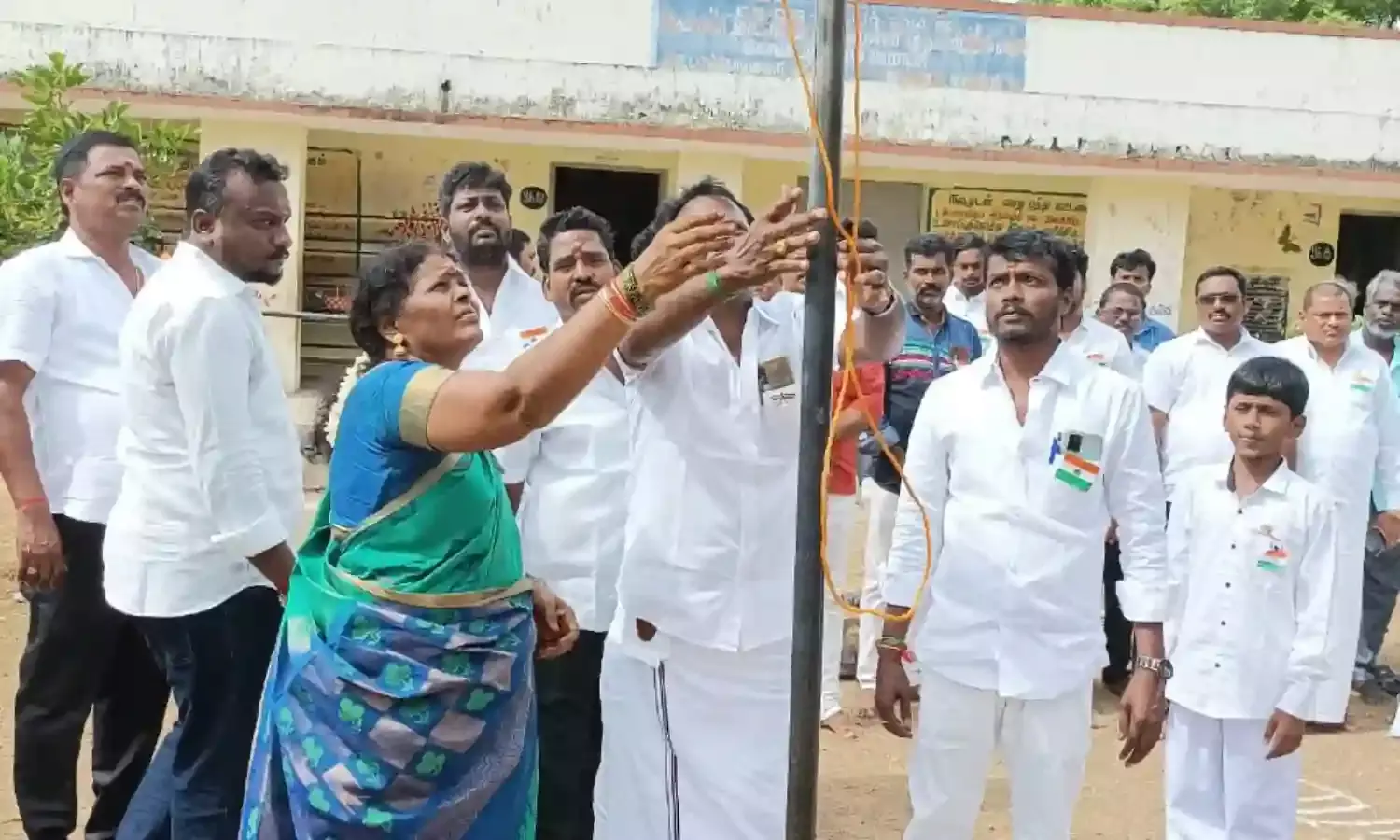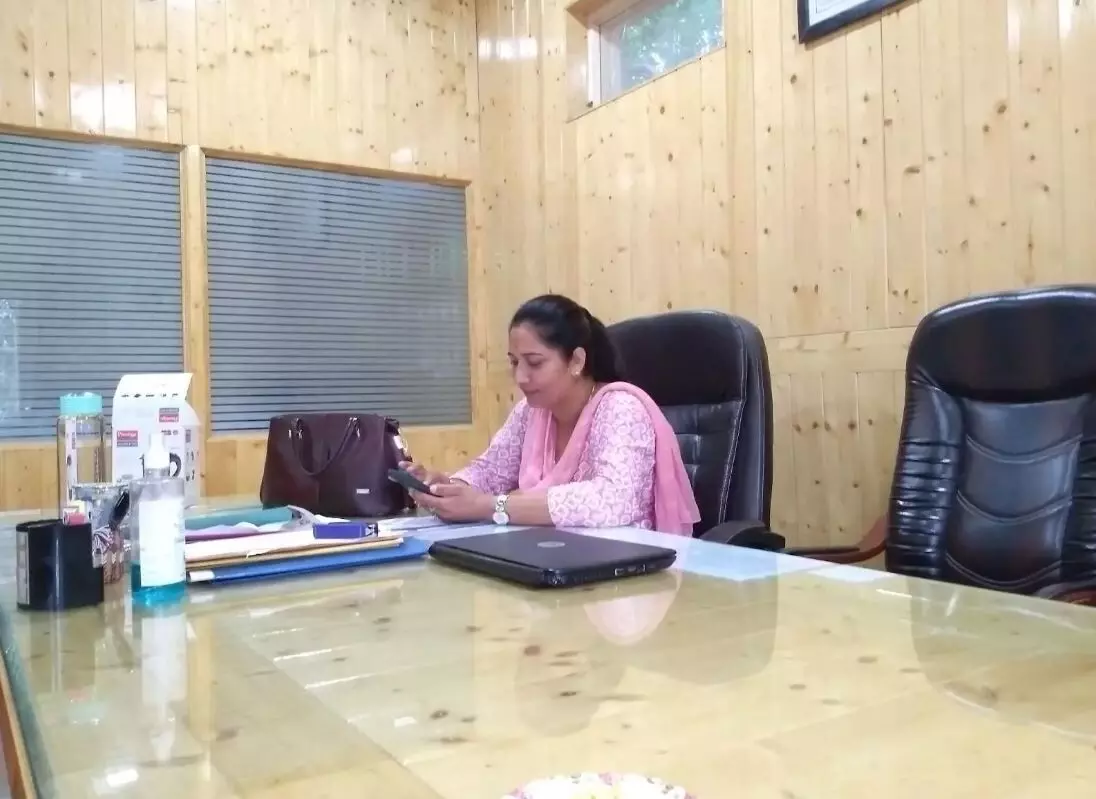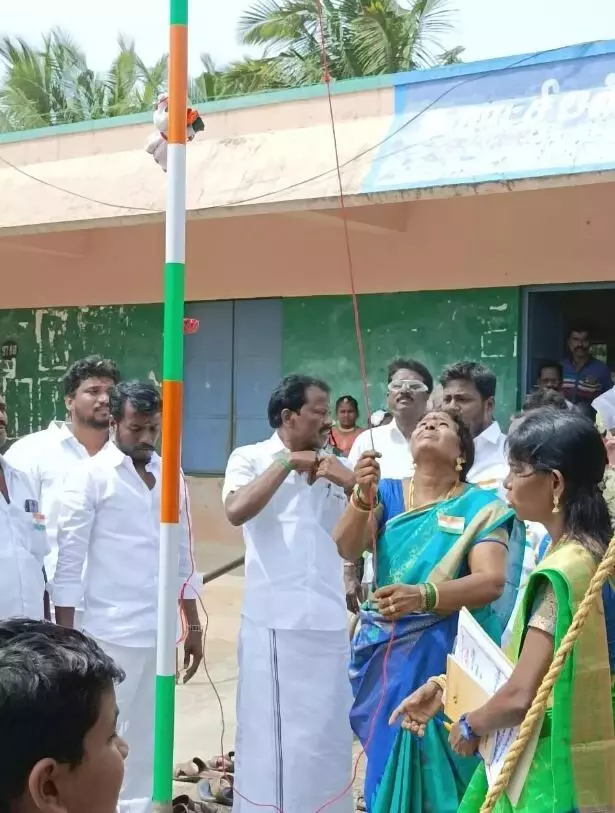Women Panchayat Leaders Take Indian Democracy Ahead
'It is a long fight where everyone needs to pitch in'

India as a democracy has continued to evolve despite towering challenges. There have been occasions where the elected governments, even those with brute majority, have had to face the real power of the people inside or outside the electoral domain.
In this journey, the 73rd and 74th amendments to the Indian Constitution have been major landmarks in law towards local self-government and decentralization of power with village panchayats as the nodal centre.
Since these amendments were passed in 1992, one of the major developments to have taken place is the increasing role of women enabled by reservation in the Panchayati Raj Institutions (PRIs). And competitive politics, despite all its shortcomings, has led to state after state being compelled to increase the role of women in running these institutions.
While Article 243 D of the Constitution of India provides for not less than one-third reservation for women out of total number of seats to be filled by direct election and number of offices of chairpersons of Panchayats, no less than 21 states have moved ahead to reserve 50% seats for women. It was Bihar that triggered this process in 2005, to be followed by 20 other state assemblies.
But challenges have been emerging. A case in point is Haryana where panchayat polls will be held in September after being overdue more than a year and a half. Things have been in abeyance there following challenges to amendments made by the government to the Haryana Panchayati Raj (Second Amendment) Act 2020.
Advocate Deep Karan Dalal has been contesting the move by the state government to cap the women contestants on 50% of the seats. "The amendment translates to women not being allowed to contest on any more seats other than the 50% reserved for them. There are around 7,000 Panchayats in Haryana and the women cannot contest in half of them. This is not the case in other states that have granted 50% reservation to women in Panchayats. This is a regressive move," Deep Karan told The Citizen.
He is also contesting in the Supreme Court the insistence in new laws made by the state government that a Scheduled Caste member cannot become a Sarpanch if the Scheduled Caste population share in a gram panchayat is less than 10%.
The Punjab and Haryana High Court had reportedly allowed the government to go ahead with the Panchayat elections subject to the outcome of the writs that will continue to be heard.
Another case in point is the reports that have been pouring in from Madhya Pradesh about the husbands of women Panchayat representatives taking oath.
Such instances reportedly occurred in Dhar, Damoh, Sagar, Pana and Rewa, where the women elected remained mute spectators as the men from their families took oath on their behalf. This led to the state government initiating action against some officials besides other measures.
Coming to individual women sarpanches and pradhans, their journeys are worth documenting. And our reporters bring a flavour of the ground situation through interviews carried out in Himachal Pradesh, Uttar Pradesh and Tamil Nadu:
The Citizen spoke to Richa Thakur, pradhan of the Basal panchayat in Solan, Himachal Pradesh.

The Panchayat office in Basal reflects the fact that the hill state of Himachal Pradesh is among the best performers in PRIs. The spick and span Pradhan's office is as good as any corporate office in a tier two city.
Richa Thakur represents a Panchayat reserved for women candidates but open to contestants from all castes or tribes. Incidentally, she comes from Devli-ki-Ser village where Dalit castes comprise up to 80% of the households.
A state level hockey player who grew up in Kasauli, Richa was married off early to a defence officer. In the process she had to give up her formal education and could not complete her graduation. But she intends to pick up the books once again pretty soon.
She represents a mindset that India actually needs. "When you sit on a public position as a woman you have to be bold. We have to rise above gender, caste and religious disparities. Only then we can develop as a society," she tells The Citizen.
"My extrovert nature and involvement with the general public had led to many people suggesting that I become a ward member. It was jokingly said that I had said that I would rather be a Pradhan, not knowing that the people would actually coax me into contesting and becoming one.
"When I entered the office I did not know much about the functioning of the PRIs but I was willing to learn. The learning has continued. I know for sure that I will never be able to sit idle at home," says the mother of two grown up children.
She recalls that her mother-in-law was a bit apprehensive of her becoming a Pradhan but her husband Mahender Singh Thakur, a gunner in the Indian Army, has been very supportive. Things gradually fell into place, and now she is driving the Panchayat where the majority of ward members are also women.
"But the journey has not been easy. It is a difficult task overcoming the patriarchal mindset of the society. People try to dominate you at every level when you are a woman. Field visits in the hills, particularly at night, are not an easy task. But I have been able to overcome these hindrances," she shares.
Just a year and a half in office she has had the Panchayat office refurbished that also houses a Lok Mitra Kendra to facilitate the works of various individuals besides a courtroom to resolve disputes of various kinds. She believes that a Panchayat's matter should be resolved in a Panchayat only.
Thakur has dreams for the village that she wants to realize. The first is to get her village connected by road.
"I have experienced the plight of the people myself when I had to walk two kilometers in the absence of a road after a cesarean delivery. It is difficult for the children, the aged and the ill to commute. I will consider my tenure to be successful if I achieve this goal."
The second goal for which she is striving is to open a restaurant that would be run entirely by women of her Panchayat. The self-help groups (SHGs) of Basal Panchayat have already made a name for themselves when it comes to manufacturing and marketing pickles, chutneys, masalas and other edibles from the local produce. The restaurant Thakur aims to set up would serve local delicacies made from locally produced raw material. She feels that this would go a step further in empowering the women of the villages.
"It's all about exposure. The more you move out the more progressive you become. The 50% reservation in Panchayats to the women is a very progressive move as they have got an opportunity to come out and be an equal participant in the local development," she underlined.
She is in the process of getting a piece of land allocated for the purpose of setting up the restaurant from the district administration, and finds the red-tapism coming from lower rung officials the biggest deterrent in carrying out developmental works.
"Things like delays in estimates and too much paperwork is a hindrance that often leads to the people making accusations against the Pradhans. These need to be simplified further."
Though not affiliated to any political party, she feels that political affiliations do play a role in the larger scheme of things.
Her present concerns include the drug menace that is catching up fast among the youth in the hills. One of the biggest challenges in the rural areas is the absence of police patrolling in the villages.
"We are forming committees in the villages to keep a watch on the developments. The youth have to be kept engaged and we are constantly trying to devise ways to do so besides making them aware of the menace. It is a long fight where everyone needs to pitch in," says the pradhan.
THE CITIZEN spoke to an articulate woman pradhan in Uttar Pradesh, Rita Varma from Kabirpur:
One day Rita Varma, 34 told her husband Umesh Kumar that she wanted to become the village head. Kumar was happy to hear his wife say that. At the last Gram Pradhan election in Uttar Pradesh (UP), he did not forget his promise and put all his might in helping his wife to realise her dream.
That is how Varma became the village head of Kabirpur, a village near Lucknow, capital of Uttar Pradesh (UP).
She won the panchayat elections with a huge margin, bagging 50 percent of the votes in the village, and earning the respect of villagers for her organisational skills in dealing with the pandemic.
In fact the number of women who won the panchayat elections in 2021 is the largest ever. The victorious women candidates have outperformed men in key positions ranging from village head to district panchayat chief.
This time a total of 31,212 women have won the election for the post of village head, 447 for block head and 42 women for the post of district panchayat president. This is more than the quota of one-third seats allotted to women.
Increasing awareness of the capability of female leadership and a jump in the number of educated contestants is responsible for the landslide victory of so many women in the panchayat elections. Women are eager to participate in the politics of the village and rural citizens are only too happy at the trend.
Agra is proud of Kalpana Singh Gurjar who returned back to her village Badagaon in UP to contest the panchayat elections for the first time. Gurjar finished her formal education in the city but returned to work in Badagaon. She believes that many more educated women should join politics.
Verma became the village head of Kabirpur last summer when Covid 19 was at its peak. Varma had little time to celebrate her win as she plunged into learning everything she could about Covid prevention. She worked round the clock sharing the same information with other residents of the village that is home to over 300 families and totalling a population of nearly 2000 people.
Varma identified volunteers in every street in Kabirpur and who were made responsible for keeping drains clean and making sure that everyone wore a mask.
Most male members of the village are employed as musicians. They play in bands during weddings where they spend hours in the midst of large crowds. Despite the fact that the villagers had stopped to organise large weddings, everyone was told the importance of keeping their hands clean by washing them regularly. Despite these precautions many in her village fell sick but they were afraid to get tested for Covid.
Varma spoke to the sick about the importance of getting tested and about receiving the correct treatment. Today Kabirpur is Covid free but Varma continues to highlight the importance of health and hygiene. She is trying her best to improve the poor sanitation conditions in the village and to bring to the notice of the authorities how bad the roads are.
Varma is in touch with concerned authorities and petitions them regularly to improve life in the village. The villagers have already been promised a primary health centre in Kabirpur. Today patients in Kabirpur have to travel nearly 12 kilometres to Gosainganj before they are able to receive medical assistance.
Women like Varma are changing the political landscape at the grassroots. Even a few years ago it was elderly men who were taken seriously all over rural UP. It was always a council of elders who were called to settle quarrels amongst villagers.
Today, the job of a village head is to be aware of development issues as well, and to have a vision of making a village a better place to live in. Younger women seem to be better at performing that role and therefore a little more respect is doled out to them today than ever before.
That has encouraged many more women to step out of the home to better educate themselves about the world, and to extend their nurturing skills for the good of a larger community of people. Many heads in villages today are women, and some of them are young and energetic who are contributing to strengthening democracy in rural areas.
In 2015, the number of people between 21 years and 35 years of age was about 35.18 percent of the total number of candidates who won the panchayat elections, out of them women were 43.8 percent.
Earlier in the 1995-96 panchayat elections, the number of candidates between 21 years and 35 years of age was about 37 percent, but a decade later in 2005, 46.61 percent of those who won the elections were under 35 years of age.
In 2015, the number of candidates in the age group of 21 years and 35 years was about 35.18 percent of the total number of candidates who won the panchayat elections and 59.4 percent of the candidates who won were between 35 years and 60 years of age.
THE CITIZEN spoke to Kalyani Ravi, the Panchayat President of Vengadamangalam, Tamil Nadu:

Dressed in a green Kancheevaram silk saree, Kalyani Ravi, the Panchayat President of Vengadamangalam, Tamil Nadu quietly waited for the independence day celebrations to begin in the government school here. She was invited as the Chief guest. The children were dressed in their costumes, ready to impress the guests with their performances. Kalyani and the ward members waited on stage for the arrival of Ravi, Kalyani's husband and the previous Panchayat President.
He soon arrived in his luxury car, that's when the real fanfare began. The crowds cheered him, including Kalyani. The couple then hoisted the flag together and sat down to watch the performances.
Later that evening, Kalyani sat down for a brief conversation with The Citizen. Speaking about her journey so far, she said, "I had never dreamt that I would be the Panchayat head some day. I grew up in this village and got married here. I never had any interest in politics. But my husband was elected as the Panchayat President before me. He did well and gained popular support. So after his term, all our supporters pushed me to stand for the post and said that it was the people's wish to see me as the President. It's been ten months now since my term began. There are a lot of things I want to change in the village. I have started by laying new roads, installing water facilities and getting electricity for many houses that didn't have it."
"Since my husband has served as President before, he knows better than me about what to do. I always consult him for everything. The political world is new for me."
"We have a lot of trouble from our political opponents. So it's really hard to get any work done. Whenever we try to do anything good, they try to stop us. However, we are doing our best. Farming used to be the main occupation in this village, but nowadays people have started moving on to other jobs which pay better."
"Being a woman, I would like to help improve the lives of women in this village. Most of the women here are sitting idly in their homes. Many of them are going through financial crisis. So the women have been looking out for jobs to support their families, but there are not enough jobs that will suit them. We hope to do something about that. I'm also planning to organise health camps specifically for women."
"One of the main demands of the people here is the education in government schools. There are two schools under my authority. All the parents have been requesting that we transform the schools into English medium schools. The children don't want to study in Tamil, neither do the parents. They long to learn in English so that they can be on par with children from private schools and get good jobs. Nowadays, without knowledge of English, it is hard to get anywhere in life. So we are trying to do something about that."
"We also plan to build a small hospital soon for people to have quicker access to healthcare. Right now, we have frequent medical camps conducted by doctors and nurses from a nearby medical college. But we are in talks to make it as frequent as twice a month."
"I have four more years. There's a lot of hope pinned on me, I hope I can fulfill the wishes of the people who elected me."
Report and interviews by RAJEEV KHANNA, MEHRU JAFFER and BLESSY MATHEW PRASAD.


